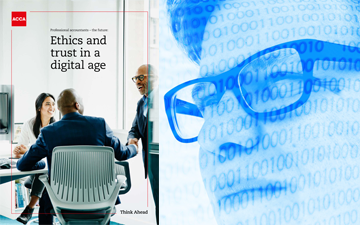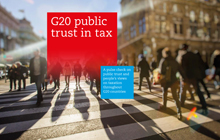Ethics and trust in a digital age

New ACCA report offers scenarios and solutions to digital ethical challenges
TORONTO – You’re the CFO of a mortgage company that provides high-interest rate loans to homebuyers with higher levels of risk than the average consumer. Your company relies on dozens of independent mortgage brokers who feed mortgage applications that most financial institutions will not accept.
In the digital age, technology has digitized origination, processing, approval and funding, and controls are in place to detect fraud, but the process still relies on verification at the source. You discover that that many of the applications include falsified information regarding the annual income of the lenders.
Is it a cybercrime? Is it fraud? What do you do?
If this scenario, which seems ripped from the touchscreens of today’s news, leads you wondering about professional ethics in the digitized world of the 21st century, then you’re not alone. According to a new report from the ACCA called “Ethics and trust in a digital age,” Canadian accountants feel that ethical behaviour is crucial in today’s technology-driven world:
- 92 per cent agreed that strong ethical principles and behaviour will become more important in the digital age. (89 per cent of accountants globally agreed.)
- 97 per cent agreed that ethical behaviour helps to build trust in the digital age. (93 per cent of accountants globally agreed.)
- 85 per cent agreed that professional accountants act in the public interest. (78 per cent of accountants globally agreed.)
- 85 per cent agreed that professional accountants upholding their code contributes to organizations’ ability to uphold ethics. (80 per cent of accountants globally agreed.)
- 97 per cent agreed that IESBA principles still apply and remain relevant in the digital age. (94 per cent of accountants globally agreed.)
Real-life ethical scenarios in the digital age
The real benefit of the ACCA report lies in the practical application of an “ethical lens” to six digital themes:
- Cybersecurity
- Platform-based business models
- Big data and analytics
- Cryptocurrencies and distributed ledgers
- Automation, artificial intelligence and machine learning
- Procurement of technology
For each theme, two ethically challenging situations are identified and assessed against ethical principles. Each situation is applied separately to management accountants and auditors, and explores the compromise of ethical principles and an appropriate response to the scenario.
For example, in the first scenario, on cybersecurity, the report explores an appropriate response to hackers compromising an open-source database and holding the data for a ransom of cryptocurrencies. What would you do?
Download the report to find out more, as it builds on strong reports released by the ACCA recently, such as the “G20 public trust in tax” survey.
Colin Ellis is the editor-in-chief of Canadian Accountant.










(0) Comments